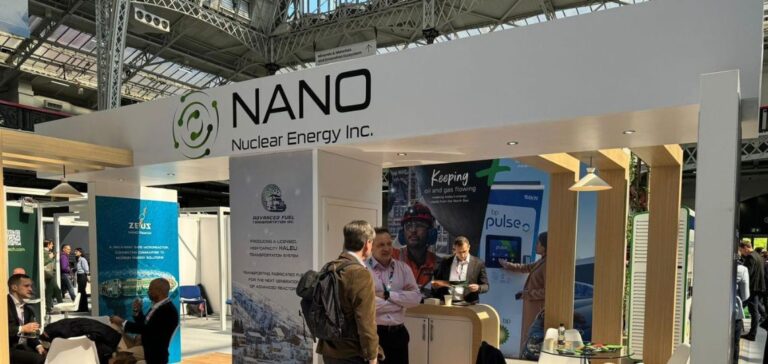NANO Nuclear recently signed a Memorandum of Understanding (MOU) with Curio Solutions, a Washington D.C.-based company, to optimize the recycling of nuclear fuel used in its advanced portable micro-reactors. Curio Solutions, renowned for its innovations in nuclear recycling, will provide its NuCycle technology to increase the modularity, capacity and economic viability of recycling operations. Nuclear recycling projects are gathering pace, as in the case of Oklo, headed by Sam Altman, founder of ChatGPT.
Curio’s NuCycle technology uses advanced chemistries to improve the nuclear fuel recycling process, reducing waste while maximizing fuel efficiency. This strategic partnership will enable these advanced methods to be integrated into NANO Nuclear‘s micro-reactors, notably the ‘ZEUS’ and ‘ODIN’ models, which are in the advanced development phase. The main aim of this collaboration is to make NANO Nuclear’s micro-reactors more efficient and safer.
Perspectives on Collaboration
The MOU provides for an initial one-year collaboration period, during which the two companies will work on optimizing NANO Nuclear’s fuel designs for improved recyclability. The collaboration will also explore the possibility of integrating recycled fuel into NANO Nuclear’s advanced reactors, using the NuCycle process. If the results obtained are promising, the companies could formalize this agreement in more detailed, definitive documents.
NANO Nuclear stands out in the sector for its innovative approach to portable micro-reactors. The ‘ZEUS’ model, for example, is designed to generate between 1 and 2 megawatts of clean electricity without the use of coolants, significantly improving safety and reliability. The ‘ODIN’ model features ALIP (annular linear induction pump) technology, which eliminates decay heat passively, using natural circulation.
Directors’ declarations
Edward McGinnis, CEO of Curio, expressed his enthusiasm for the collaboration, noting that NANO Nuclear’s innovative approach to reactor design aligns perfectly with Curio’s vision for a sustainable nuclear future. “Our collaboration with NANO Nuclear demonstrates our commitment to working with the entire nuclear industry to develop advanced, sustainable solutions,” he said.
Jay Yu, President of NANO Nuclear, also expressed his satisfaction with the initiative, highlighting the importance of integrating cutting-edge technologies to strengthen the company’s market position. “We’re delighted to be working with Curio, a company renowned for its expertise in nuclear fuel recycling, to make our reactors even cleaner and more efficient,” he said.
James Walker, CEO of NANO Nuclear, added that the collaboration would push back the boundaries of nuclear technology. “Our portable micro-reactors represent a paradigm shift in the way we think about nuclear power, making it more accessible and adaptable to the world’s energy needs,” he said. “By collaborating with Curio, we’re looking to optimize our designs for recycling, creating the potential for a truly sustainable nuclear fuel cycle.”
The collaboration between NANO Nuclear Energy and Curio Solutions represents a major step forward in the field of nuclear fuel recycling. This initiative aims to enhance the efficiency, safety and durability of portable micro-reactors, by integrating advanced recycling technologies. The success of this collaboration could transform the way nuclear fuel is used and recycled, paving the way for a cleaner, more responsible energy future.






















